Ever wonder what goes on inside the mind of an economy expert? Wiht all those charts, graphs, and jargon, it can feel like they’re speaking another language. But understanding how these whizzes think can actually make a huge difference in how you see the world-and your wallet. In this post, we’re diving headfirst into the brain of an economy guru to break down what they really focus on, why it matters, and how you can pick up a few nuggets of wisdom to get smarter about money, markets, and maybe even the future. LetS get into it!
Getting Real With Economic Jargon Decoding What Experts Really Mean
When economists toss around terms like quantitative easing or inflation expectations, it’s easy to feel like you’ve landed in a different dimension. But behind these buzzwords lies a kind of shorthand experts use to speed up complex concepts. For example, when someone talks about stagflation, they’re really describing a frustrating, rare scenario where slow economic growth meets high inflation – a combo that’s tough to fix. Understanding these phrases is less about memorizing definitions and more about grasping the feelings and scenarios they capture:
- Liquidity: How easily money flows in the economy, like how quickly you can get your hands on cash or assets.
- Fiscal stimulus: Government efforts to boost the economy, frequently enough by spending more or cutting taxes.
- Market correction: A natural, usually brief, dip in stock prices to balance overvalued assets.
To help break this down quickly, here’s a snapshot of a few key terms and what they really mean in everyday life:
| Term | what It means | Why It Matters |
|---|---|---|
| GDP (Gross Domestic Product) | Total value of goods & services produced | Shows economic health and growth pace |
| Interest Rate | Cost of borrowing money | Impacts loans, mortgages, and spending |
| Bear Market | A drop in stock prices of 20% or more | Signals economic caution or downturn |

How Economy Experts Spot Trends Before They Hit Mainstream
Experts in the economic arena have a knack for zeroing in on subtle shifts well before they grab headlines or dominate market chatter. It ofen boils down to a deep dive into early indicators like consumer behaviour changes, emerging technologies, and fresh policy proposals. They’re tuned in to niche sectors, spotting startups or regional trends that might explode into global phenomena. This ability to recognize the ripple effects of minor events-like a surge in electric vehicle parts sales or shifts in commodity pricing-lets them forecast wider economic movements with surprising accuracy.
To do this, economy pros often rely on a mix of data sources and real-world signals, combining hard numbers with human intuition. Here’s a snapshot of their typical toolkit:
- Sentiment analysis from social media and news outlets
- Supply chain fluctuations hinting at demand changes
- Government spending and legislative hints
- Cross-industry innovation spillovers-like AI impacting both finance and manufacturing
| Indicator | What It Signals |
|---|---|
| Unusual hiring Patterns | Upcoming sector growth |
| Commodity Price Swings | Supply-demand imbalance |
| Patent Filings | Tech breakthroughs ahead |
| Social Media buzz | Early consumer interest |

The Mental Hacks Pros Use to Stay Ahead in a Chaotic Market
Top-tier market strategists don’t just rely on cold data-they harness psychological tactics to maintain an edge when the economy feels like a rollercoaster. One of their secret weapons is mental compartmentalization, where they isolate emotions from facts to avoid reactionary moves. By doing so, they can zoom out and interpret trends without the noise of fear or hype clouding their judgment. This approach enables them to spot opportunities others miss and respond with precision rather than panic.
Another game-changer is their deliberate use of micro-breaks,even during rapid-fire market shifts. Brief moments spent away from screens help declutter their minds,encouraging clarity and creative problem-solving. You’ll also find pros leaning on cognitive tools, like mental checklists, to combat biases-ensuring they stay objective and disciplined. Here’s a rapid snapshot of the mental habits that help them thrive:
- Anchoring Awareness: Recognizing when first impressions skew decisions.
- Scenario Visualization: Running “what if” analyses mentally to prepare for volatility.
- Selective Ignorance: Filtering out non-essential noise to focus on impactful data.
| Mental Hack | Benefit |
|---|---|
| Emotional Detachment | Clear decisions under pressure |
| Micro-Breaks | Improved focus and creativity |
| Bias Awareness | More objective market interpretation |
Smart Money Moves Economy Experts Swear By for Personal Finance
When it comes to managing your money, economy experts don’t just follow trends-they create a framework built on solid principles. One of their go-to strategies is building an emergency fund to cover at least 3-6 months of living expenses. This isn’t just a safety net; it’s a mindset that prioritizes stability over impulsive decisions. alongside this, they champion diversifying income streams by investing in stocks, bonds, or even side businesses. The goal? Making your money work for you, instead of relying solely on a paycheck.
Experts also swear by mastering the art of budgeting, but not in a restrictive way. Instead, they focus on tracking spending habits to spot leaks and optimize savings without sacrificing lifestyle. Here’s a quick rundown of their favorite smart moves:
- Automate savings: Set it and forget it to build wealth effortlessly.
- Invest early: Time is your best ally for compounding gains.
- limit high-interest debt: Prioritize paying down credit cards and loans.
- Continuously upskill: Increase your earning potential through education.
| Smart Move | Why It Works |
|---|---|
| Automated savings | Reduces the risk of forgetting and builds consistency. |
| Early Investments | Harnesses compound interest over the long term. |
| Debt Management | Minimizes financial strain and interest costs. |
Why Understanding Economic Cycles Can Change How You Handle Your Cash
Recognizing the ebb and flow of economic cycles gives you a powerful edge in managing your finances. Instead of blindly reacting to market noise or economic headlines,you gain a strategic perspective. during expansion phases, such as, it might be tempting to splurge, but savvy individuals focus on building cash reserves or investing in growth opportunities before the downturn hits. Conversely, recessions aren’t just gloomy periods-they’re prime times to seek bargains, refinance debt, or prioritize emergency savings. Understanding these cycles means you’re not just surviving the ups and downs, but actively leveraging them to improve your financial health.
Here are a few smart moves you can make based on economic cycle awareness:
- During Growth: Ramp up investments, especially in stocks and real estate.
- Approaching Peak: Diversify your portfolio and lock in profits.
- In a Recession: Focus on liquidity and reduce high-interest expenses.
- Recovering Phase: Slowly increase spending and take calculated risks again.
| Economic Phase | Cash Strategy | Risk Level |
|---|---|---|
| Expansion | Invest aggressively | Medium-High |
| Peak | Take profits & diversify | High |
| Contraction | Hold cash reserves | Low |
| Trough | Seek bargains | Medium |
Q&A
Inside the Mind of an Economy Expert: What You Should No – Q&A
Q: So,what exactly does an economy expert do all day?
A: Great question! Think of an economy expert as a detective for money and markets. They analyse data, spot trends, and try to predict what might happen next in the economy. It’s like connecting the dots between what people buy, how businesses grow, and what governments decide to do with money.
Q: Why should I even care about what an economy expert says?
A: Because their insights can affect your wallet! Decisions made based on their advice influence interest rates, job markets, inflation, and even the prices of your morning coffee. Understanding their perspective helps you make smarter financial choices-whether you’re investing, saving, or just budgeting for your next vacation.
Q: Do economy experts have superpowers to predict the future?
A: Not quite.They use tons of data and models to forecast trends, but the economy is shaped by so many unpredictable factors like politics, technology, and even human emotions. So, think of them more like weather forecasters: usually helpful, sometiems surprised by a sudden storm.
Q: What’s one thing everyone often misunderstands about the economy?
A: That it’s just about money moving around. It’s really about people-how they earn, spend, save, and invest. The economy reflects human behavior on a massive scale, which is why it’s so complex and sometimes messy.
Q: Can anyone become an economy expert,or do you need some sort of magic degree?
A: While a background in economics,finance,or statistics helps,curiosity and critical thinking matter just as much. Plenty of economy experts started from different places but developed their skills by diving deep into data and staying curious about how money ticks.
Q: What’s a hot topic economy experts are obsessing over right now?
A: Inflation and how governments are handling it is indeed a huge focus.Experts are debating the best ways to keep prices stable without slowing down growth-kind of like trying to keep a party lively but under control simultaneously occurring.
Q: Any quick tips from economy experts for everyday folks?
A: Yes! Keep an eye on inflation trends, be mindful of interest rates if you’re borrowing or saving, and don’t put all your eggs in one basket when investing. Basically, stay informed but don’t panic-economies go through cycles, and being patient pays off.
Feeling a bit more pleasant inside the brain of an economy expert? Hopefully,this peek behind the curtain helps you feel less intimidated and more curious about the world of money and markets!
Future Outlook
And there you have it-a little peek inside the mind of an economy expert! Hopefully,this gave you a clearer idea of what drives those complex economic insights and why they matter to all of us. Next time you read about interest rates, market shifts, or economic forecasts, you’ll have a better sense of the reasoning behind them. Remember, the economy isn’t just numbers and graphs-it’s about people, decisions, and the everyday choices that shape our world. Stay curious,keep asking questions,and who knows? Maybe you’ll be the next expert demystifying the economy for everyone else! Until next time,happy learning!











